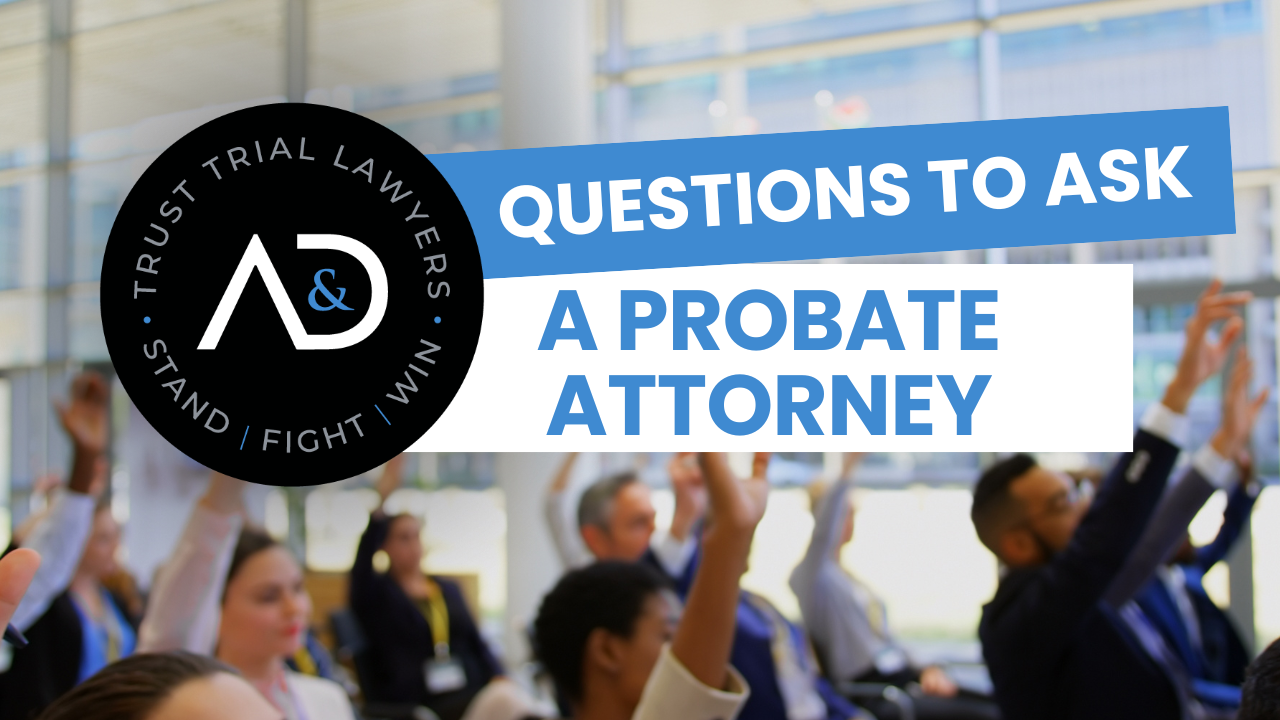
Probate can be a complex and confusing area of law. Whether you’re a beneficiary, executor, or concerned family member, it’s important to come prepared when speaking to a probate attorney in San Diego. Asking the right questions can help you understand your rights, responsibilities, and the overall legal process.
The questions you ask will depend on whether the probate case involves administration (where things are proceeding smoothly) or litigation (where disputes arise). Below, we break it down by both types.
Call us at (858) 209-2309 to set up a free consultation today.
Probate Administration: Key Questions to Ask

When a loved one passes away leaving a will, the court oversees the process of administering the estate—this is called probate. If you’re involved in this process, especially as a beneficiary, here are the essential questions to ask your probate lawyer:
- How long does the probate process take?
Probate often takes 12 to 18 months, though it may take longer if complications arise. - What are the responsibilities of the executor?
Executors must notify creditors, collect and inventory assets, pay debts and taxes, prepare accountings, and distribute the estate according to the will. - Can estate assets be sold during probate?
Yes. If the executor has court-granted independent powers, they can sell real estate without court approval. Otherwise, the court must approve any sales. - When can beneficiaries receive their inheritance?
Beneficiaries receive distributions either through a preliminary distribution (court-approved during the process) or a final distribution at the end. - When is the executor required to account to beneficiaries?
Executors must account at least annually and at the end of the probate. Beneficiaries can waive this requirement by unanimous agreement. - How can beneficiaries monitor probate?
By filing a Request for Special Notice, beneficiaries receive updates on court filings. Regular communication with the executor is also encouraged. - How does probate end?
Probate concludes when the executor files a petition for final distribution and the court approves it, closing the estate. - Do beneficiaries need their own lawyer?
Not always. If there are no disputes, beneficiaries can monitor the estate without hiring a lawyer. But legal help may be needed if problems arise.
Probate Litigation: When Things Go Wrong
Litigation arises when there’s a dispute—such as a contested will, misconduct by an executor, or disagreement over how assets are being handled. In these situations, your lawyer becomes your key advocate.

Key Questions for Probate Litigation Cases
- When can I contest a will?
You must contest a will before it’s admitted to probate. Once admitted, there’s a 120-day window to challenge it in court. - What if the will has already been admitted to probate?
You have 120 days from the date of admission to file a petition to revoke probate. After that, it’s too late to contest the will. - Can I have the executor removed?
Yes—if you have proof of breach of fiduciary duty, such as mismanagement, theft, or failure to act, you can file a petition to remove the executor. - What if assets are missing from the inventory?
Beneficiaries can object to the Inventory & Appraisal if assets are omitted or misvalued. Review all filings carefully. - How do I force the executor to provide an accounting?
File a petition for accounting. Some courts will order an accounting on their own if one isn’t submitted in a timely manner. - Can I force a distribution from the estate?
Yes. Beneficiaries have the right to file a petition requesting a preliminary or final distribution if delays are unreasonable. - How can I get information about estate assets?
You can demand information directly from the executor. If necessary, your attorney can issue subpoenas to banks or financial institutions for asset records.
Final Thoughts
Understanding the probate process starts with asking the right questions. Whether you’re dealing with a straightforward administration or facing complex litigation, being informed puts you in a stronger position to protect your rights and interests.
If you’re unsure whether you need legal help, consider scheduling a free consultation with an experienced probate lawyer. A good lawyer can quickly assess your situation and guide you on the best course of action.

